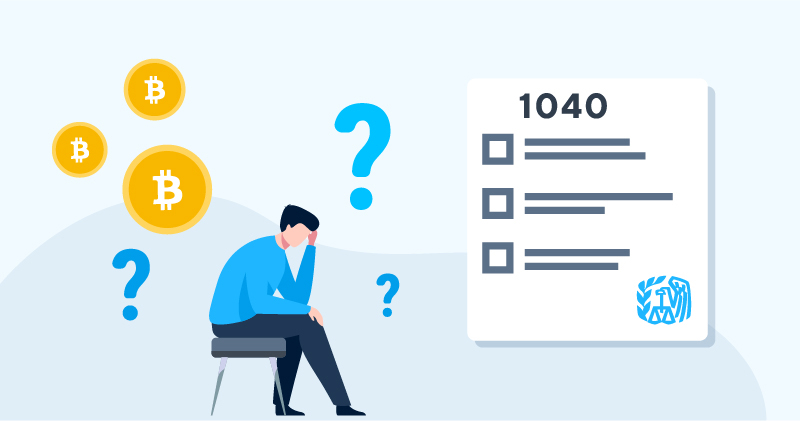

Key Takeaways
- You must answer ‘Yes’ to the 1040 crypto tax question if you earned, sold, gifted, or disposed of cryptocurrency.
- If you only purchased, held, or transferred crypto between your own wallets in 2024, you should answer ‘No’.
Wondering whether you need to answer ‘Yes’ to the crypto tax question on Form 1040?
In this guide, we’ll break down everything you need to know about the cryptocurrency question on Form 1040. We’ll break down when investors need to answer ‘Yes’, explore the potential tax ramifications of answering the question, and discuss the next steps you should take when it comes to filing your taxes.
The crypto tax question for 2025
This year, the crypto tax question reads the following:
“At any time during 2024, did you: (a) receive (as a reward, award, or payment for property or services); or (b) sell, exchange, or otherwise dispose of a digital asset (or a financial interest in a digital asset)?
When must you answer ‘Yes’ to the 1040 virtual currency question?
You must answer yes to the virtual currency question if you conducted one or more of the following transactions in 2024:
- Received crypto for free or for payment for goods or services provided
- Received crypto from an airdrop, hard fork, mining or staking
- Sold crypto for fiat currency (like USD)
- Exchanged one crypto for another
- Exchanged cryptocurrency for property, goods or services
- Gifted crypto to a friend or family member
If you answer ‘yes’, it’s likely that you owe crypto taxes. The only exceptions are if you gifted cryptocurrency (not taxable in most circumstances) or received a crypto gift.
When can you answer ‘No’ to the 1040 virtual currency question?
You do not need to check ‘Yes’ to the virtual currency question if in 2024 you only:
- purchased cryptocurrency
- held cryptocurrency in wallets or accounts
- transferred crypto between self-owned or self-controlled wallets or accounts
In other words, if you simply held your cryptocurrency and did not make any sales or earn any crypto income during the 2024 tax year, you do not need to answer ‘Yes’ to the Form 1040 question.
However, you should check ‘Yes’ if you’ve gifted crypto to a friend or family member. While this is not typically a taxable transaction, it’s likely that the IRS wants to track this information in case of future disposals ((gifting can be subject to gift tax if you exceed the $13.61 million lifetime exemption).
Why does the IRS ask if you own crypto?
Some investors feel nervous about answering ‘Yes’ to the 1040 question because they are afraid that it may increase the likelihood of a tax audit.
It’s likely that these fears are unfounded. At this time, tax experts say that the IRS is asking this question to better understand how many Americans are actively transacting in cryptocurrency. There’s no evidence that answering ‘Yes’ could potentially lead to an audit.
On the other hand, answering ‘No’ to the question when the taxpayer has relevant crypto transactions for the year could be considered tax fraud and lead to criminal penalties.
What are the next steps after answering ‘Yes’ to the Form 1040 question?
Once you answer ‘Yes’ on the cryptocurrency tax question on Form 1040, you should report all of your taxable cryptocurrency transactions on your tax return.
Typically, cryptocurrency disposals need to be reported on Form 8949, and summarized on Schedule D. Income events are generally reported on Schedule 1 Form 1040.
For more information, check out our guide to reporting crypto on your tax return.
What are the next steps after answering ‘Yes’ to the Form 1040 question?
Once you answer ‘Yes’ on the cryptocurrency tax question on Form 1040, you should report all of your taxable cryptocurrency transactions on your tax return.
Typically, cryptocurrency disposals need to be reported on Form 8949, and summarized on Schedule D. Income events are generally reported on Schedule 1 Form 1040.
File your crypto taxes today!
Crypto tax software like CoinLedger can make filing your taxes easier than ever.
With CoinLedger, you can automatically pull in transactions from hundreds of exchanges and wallets. Once you’re done uploading your transactions, you can generate complete tax forms with the click of a button.
Frequently asked questions
How we reviewed this article
All CoinLedger articles go through a rigorous review process before publication. Learn more about the CoinLedger Editorial Process.

CoinLedger has strict sourcing guidelines for our content. Our content is based on direct interviews with tax experts, guidance from tax agencies, and articles from reputable news outlets.




































.png)
















